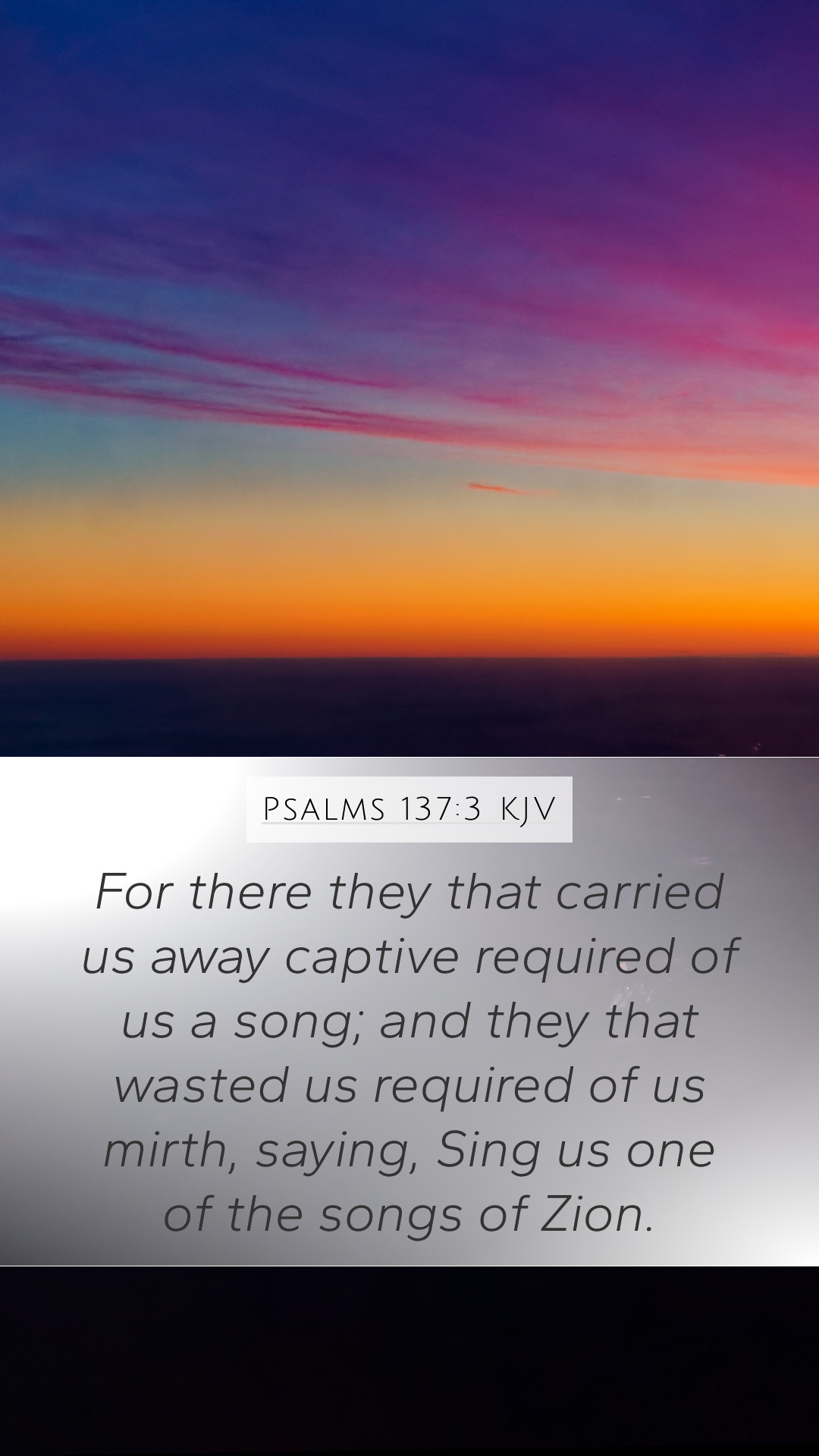Bible Verse Meaning and Commentary on Psalms 137:3
Psalms 137:3 states, "For there our captors asked us for songs, and our tormentors demanded songs of joy; they said, 'Sing us one of the songs of Zion!'" This verse captures the profound grief and sorrow of the Jewish people during their Babylonian exile. Below, we explore the meaning of this verse through insights from respected public domain commentaries.
Contextual Background
The Book of Psalms is a collection of religious songs, prayers, and poems that express the full range of human emotion, from joy to despair. Psalm 137 is written during a time of deep anguish for the Israelites as they are exiled in Babylon. This was not just a physical displacement but also a spiritual crisis as their identity as a worshipping people is challenged.
Analysis of Psalms 137:3
This verse is significant for several reasons:
- The Pain of Exile: The captors’ request for a song highlights the painful contrast between the joyous worship of Zion and the sorrow of exile. The exiled Israelites long for their homeland and the blessings associated with it (Matthew Henry).
- The Mockery of Captors: The tormentors’ demand represents a mocking of the Israelites’ faith and identity. By asking them to sing the songs of Zion, the Babylonians are not only demanding entertainment but also ridiculing the Israelites’ God (Albert Barnes).
- The Nature of Grief: This request brings forth the emotions of grief and heartbreak. The exiles cannot simply produce joy on command while they are in deep sorrow, showcasing the struggle between faith and despair (Adam Clarke).
Theological Insights
Several theological insights emerge from this verse:
- Identity and Worship: The longing to sing the songs of Zion reflects a deeper yearning for identity and connection with God. Worship is an intrinsic part of the Israelites’ cultural and spiritual identity, and exile threatens this (Matthew Henry).
- Divine Suffering: The verse underscores the theme of divine suffering. God's people endure torment not only in their physical circumstances but also in their spiritual separation from Him (Albert Barnes).
- The Hope of Restoration: Implicit in their sorrow is the hope for restoration. The act of remembering Zion indicates a longing for eventual return to their homeland and to God’s presence (Adam Clarke).
Interpretation and Application
The interpretation of Psalms 137:3 encourages believers today to reflect on the nature of their worship and what it means to them during difficult times:
- Understanding Grief: Acknowledge that grief is a natural response to loss and change. Just as the Israelites mourned for Zion, it is important for us to lament during challenging periods in our lives.
- Value of Community: The pressure from captors signifies external expectations on a community of faith. In “Bible study groups,” members can support one another through shared experiences of sorrow and joy.
- Maintaining Worship: Despite circumstances, finding ways to worship and connect with God can provide comfort and restoration, essential in our “Bible study lessons” and personal reflections on faith.
Related Scripture Cross References
- Jeremiah 29:11: Promises of hope and a future for the exiled.
- Psalm 42:1: A deep longing for God similar to the Israelites’ longing for Zion.
- Lamentations 1:3: Highlights the desolation felt by those in exile.
Conclusion
Psalms 137:3 serves as a poignant reminder of the complexities of faith during trials. The psalm not only expresses sorrow but also a resilient hope rooted in God’s promise of restoration. For anyone seeking Bible verse meanings or Bible verse interpretations, this verse provides a profound insight into the experience of God’s people and the significance of worship in their journey through grief.


